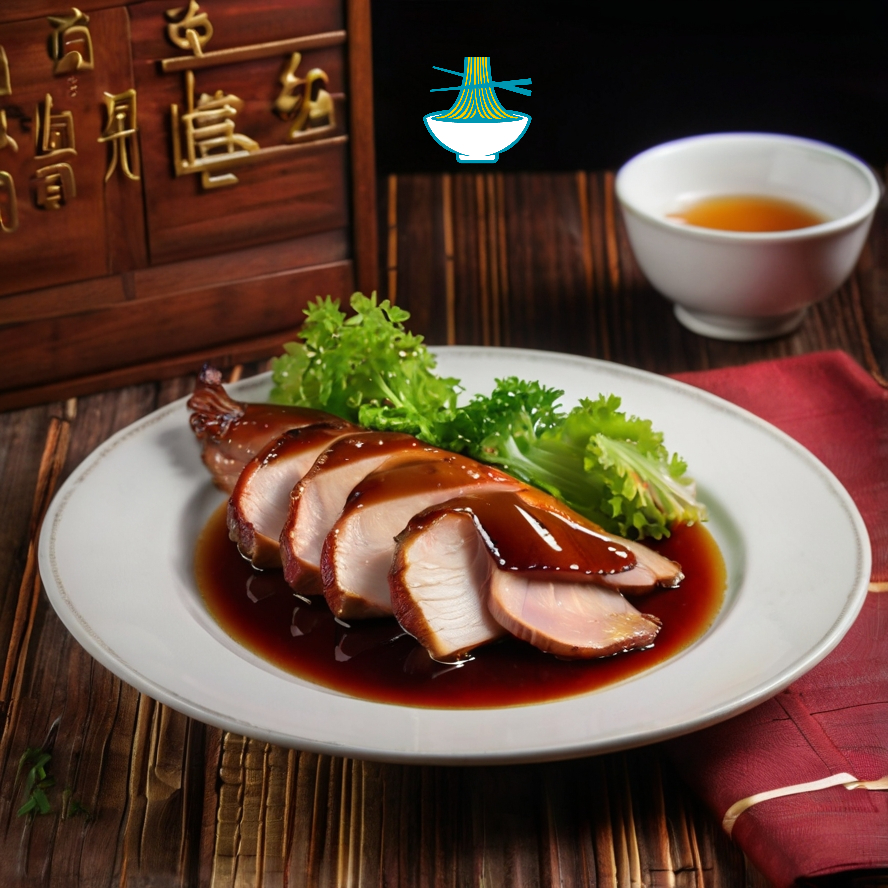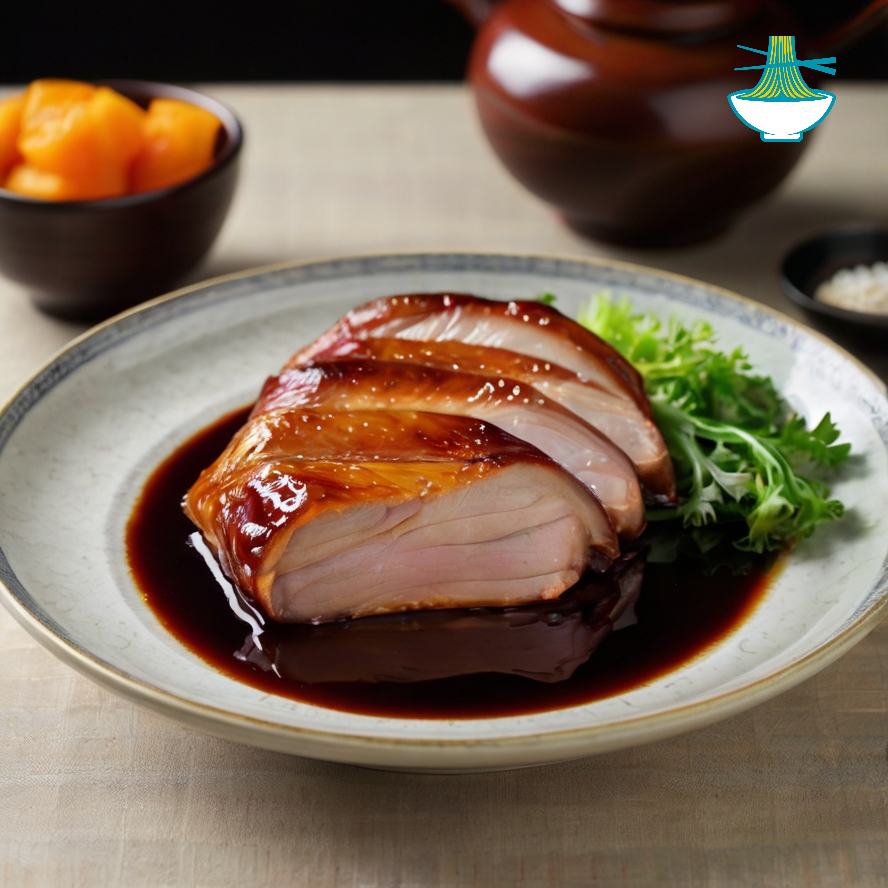Peking Roasted Duck is a celebrated Chinese dish renowned for its crispy skin and flavorful meat. Originating from Beijing, this iconic dish is traditionally served with thin pancakes, scallions, and sweet bean sauce. The meticulous preparation process involves marinating the duck, drying it, and roasting it to achieve its distinctive crispiness and tender meat.

Peking Roasted Duck has a storied history dating back to the Ming Dynasty, where it was a favorite in the imperial kitchens of Beijing. Originally served to emperors, the dish symbolizes Chinese culinary artistry and has evolved into a cherished staple for special occasions and festive gatherings. Its preparation and presentation have become a cultural hallmark, reflecting the rich heritage of Chinese cuisine.
Ingredients:
- 1 whole duck (about 5 pounds)
- 1 cup honey
- 1 cup soy sauce
- 2 tablespoons rice vinegar
- 2 tablespoons Shaoxing wine (or dry sherry)
- 1 teaspoon five-spice powder
- 1 teaspoon garlic powder
- 1 teaspoon salt
- 1/4 teaspoon white pepper
- 4-5 cups boiling water
Instructions:
1. Prepare the Marinade:
- In a bowl, mix honey, soy sauce, rice vinegar, Shaoxing wine, five-spice powder, garlic powder, salt, and white pepper. Stir until well combined.
2. Marinate the Duck:
- Pour the marinade into the duck's cavity, ensuring even distribution. Prick the duck's skin all over with a needle or toothpick to help the fat render and the skin become crispy.
3. Dry the Duck:
- Hang the duck in a cool, dry place for at least 6 hours or overnight to dry out the skin. This step is crucial for achieving a crispy texture.
4. Roast the Duck:
- Preheat your oven to 375°F (190°C). Pour boiling water over the duck to rinse off excess marinade. Place the duck on a wire rack in a roasting pan.
- Roast for 1 hour and 20 minutes, turning halfway through to ensure even browning. Let the duck rest for 10 minutes before carving.
5. Serve:
- Carve the duck into thin slices and serve with pancakes, scallions, and sweet bean sauce. Enjoy the combination of crispy skin, tender meat, and flavorful accompaniments.
Nutritional Note:
Peking Roasted Duck provides a rich source of protein, iron, and vitamin B-12. Though high in fat, it can be enjoyed in moderation as part of a balanced diet.

Nutriton Value:
1. Whole Duck (about 5 pounds)
- Calories: Approximately 3,500
- Carbohydrates: 0 grams
- Protein: 275 grams
- Fat: 280 grams
- Sodium: 300 milligrams
- Cholesterol: 1,200 milligrams
- Vitamins: Rich in vitamin B12, niacin, and riboflavin
- Minerals: High in iron, phosphorus, and zinc
- Nutritional Benefit: Duck meat is an excellent source of high-quality protein and essential nutrients. It provides energy, supports immune function, and contributes to overall health.
2. Honey (1 cup)
- Calories: 1,030
- Carbohydrates: 286 grams
- Protein: 1 gram
- Fat: 0 grams
- Sodium: 10 milligrams
- Cholesterol: 0 milligrams
- Vitamins: Contains trace amounts of B vitamins, including riboflavin and niacin
- Minerals: Provides small amounts of calcium, iron, magnesium, and potassium
- Nutritional Benefit: Honey adds natural sweetness and contains antioxidants that can help protect cells from damage. It also has antimicrobial properties.
3. Soy Sauce (1 cup)
- Calories: 120
- Carbohydrates: 10 grams
- Protein: 10 grams
- Fat: 0 grams
- Sodium: 1,900 milligrams
- Cholesterol: 0 milligrams
- Vitamins: Contains small amounts of B vitamins
- Minerals: Provides sodium and trace amounts of iron and magnesium
- Nutritional Benefit: Soy sauce adds flavor and umami to dishes. It can provide some protein and minerals but is high in sodium.
4. Rice Vinegar (2 tablespoons)
- Calories: 6
- Carbohydrates: 1 gram
- Protein: 0 grams
- Fat: 0 grams
- Sodium: 0 milligrams
- Cholesterol: 0 milligrams
- Vitamins: Contains trace amounts of B vitamins
- Minerals: Provides small amounts of potassium
- Nutritional Benefit: Rice vinegar adds a tangy flavor with minimal calories. It may support digestion and help regulate blood sugar levels.
5. Shaoxing Wine (or dry sherry) (2 tablespoons)
- Calories: 30
- Carbohydrates: 2 grams
- Protein: 0 grams
- Fat: 0 grams
- Sodium: 0 milligrams
- Cholesterol: 0 milligrams
- Vitamins: Contains trace amounts of B vitamins
- Minerals: Provides small amounts of potassium
- Nutritional Benefit: Shaoxing wine adds depth of flavor and may aid in digestion. It is used in small amounts, so its nutritional impact is minimal.
6. Five-Spice Powder (1 teaspoon)
- Calories: 6
- Carbohydrates: 1 gram
- Protein: 0 grams
- Fat: 0 grams
- Sodium: 0 milligrams
- Cholesterol: 0 milligrams
- Vitamins: Contains small amounts of B vitamins
- Minerals: Provides trace amounts of calcium and iron
- Nutritional Benefit: Five-spice powder adds aromatic spices and can enhance digestion and metabolism.
7. Garlic Powder (1 teaspoon)
- Calories: 5
- Carbohydrates: 1 gram
- Protein: 0 grams
- Fat: 0 grams
- Sodium: 1 milligram
- Cholesterol: 0 milligrams
- Vitamins: Contains trace amounts of vitamins B6 and C
- Minerals: Provides small amounts of calcium, iron, and potassium
- Nutritional Benefit: Garlic powder adds flavor and has potential anti-inflammatory and immune-boosting properties.
8. Salt (1 teaspoon)
- Calories: 0
- Carbohydrates: 0 grams
- Protein: 0 grams
- Fat: 0 grams
- Sodium: 2,300 milligrams
- Cholesterol: 0 milligrams
- Vitamins: Contains no vitamins
- Minerals: Provides sodium
- Nutritional Benefit: Salt is essential for fluid balance and nerve function but should be used in moderation to avoid excessive sodium intake.
9. White Pepper (1/4 teaspoon)
- Calories: 2
- Carbohydrates: 0 grams
- Protein: 0 grams
- Fat: 0 grams
- Sodium: 0 milligrams
- Cholesterol: 0 milligrams
- Vitamins: Contains small amounts of vitamins B6 and K
- Minerals: Provides trace amounts of iron and potassium
- Nutritional Benefit: White pepper adds a mild heat and flavor to dishes. It may aid digestion and has antioxidant properties.
10. Boiling Water (4-5 cups)
- Calories: 0
- Carbohydrates: 0 grams
- Protein: 0 grams
- Fat: 0 grams
- Sodium: 0 milligrams
- Cholesterol: 0 milligrams
- Vitamins: Contains no vitamins
- Minerals: Contains no minerals
- Nutritional Benefit: Boiling water helps to remove excess marinade and is essential for the cooking process, but it does not contribute any nutrients.


Comments